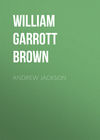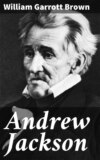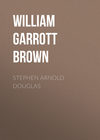Loe raamatut: «Andrew Jackson»
I
THE WAXHAWS AND THE WILDERNESS
In Lafayette Square, which fronts the White House at Washington, there is an equestrian statue of a very thin, long-headed old man whose most striking physical characteristics are the firm chin and lips and the bristling, upright hair. The piece is not a great work of art, but it gives one a strong impression of determination, if not of pugnacity. Sculptors have not the means to represent the human eye, else this impression might have been made stronger; for the old gentleman whose warlike aspect is here reproduced had a glance like a hawk's. He had, moreover, a habit of gazing fixedly at any one who attracted his attention. When he was angry, as he was quite frequently, few men could meet his look with composure. When he was in good humor, however, as he usually was when he dealt with his friends, or with women or children, his eyes could be very kindly, and his grim lips could part in a smile that was extremely attractive.
Not far away is the Treasury building. Were the horseman alive, by merely turning his head he could see its outline through the trees. There is a tradition in Washington that when this old man lived in the White House, and Congress voted to erect a new Treasury building, the old one being burned, there was some question of the exact spot on which it should stand. The question was put to him when he happened to be walking near the western end of Pennsylvania Avenue. He struck his cane on the ground and said shortly, "Put it here, sir," – and there it stands. Whether or not the story is true, it is characteristic of the man and in keeping with the history of his times; for when Andrew Jackson was President most things were done at Washington just as he ordered them to be done. His friends declared that this was so because in most things his will stood for the will of the American people; his enemies, that they were done for no good reason whatever, but only because a despot commanded his slaves to do them.
To this day there is the same division of opinion. The historians still fight the same battle over him and his doings which in former times was fought out by famous orators in Congress, by the whole people at the polls. It is doubtful, indeed, if there ever will be, until the end of the Republic itself, an end of the dispute over the place which that slender figure with the bristling hair ought to have in American history. Had Andrew Jackson any good claim to statues and monuments, to the first place in the Republic, to popularity such as no other man had enjoyed since Washington, to power such as Washington himself had never exercised? Did he prove himself worthy of the place and power he held? To answer either yes or no with assurance one must patiently examine more books than Andrew Jackson ever glanced through in his whole life. This little book would hardly contain the full titles of them all. Yet it may perhaps be large enough to let the reader see what manner of man he was concerning whom so many bitter controversies have raged. Perhaps it may serve to explain how a Scotch-Irish boy, born to the deepest obscurity and the wretchedest poverty, and blessed, apparently, with no remarkable gifts of mind or body, came to have statues carved in his honor, towns and counties and cities named for him, long books written about him, a great party organized to do his bidding, the whole country time and again divided into those who were for him and those who were against him.
It is quite important, as Mr. Parton, the most painstaking of all his biographers, often observes, that this particular poor boy was of Scotch-Irish stock. That stock is again and again conspicuous in American history, and Andrew Jackson was in many respects the most thoroughly representative Scotch-Irishman of all the notable Americans who can trace their descent to the North of Ireland. Indeed, it may be said that he narrowly escaped being born in the North of Ireland, for his parents were living at Carrickfergus until two years before his birth. They landed in America in 1765, and made their home in a Scotch-Irish settlement, the Waxhaws, on the boundary line between the two Carolinas. Andrew Jackson, the father, and Elizabeth Hutchinson, the mother, were married and had two sons before they left Carrickfergus. They were poor, and doubtless came to America for no other reason than to better their fortunes. They were still very poor when, in the early spring of the year 1767, the husband died. A few days later, March 15, a son was born to the widowed Elizabeth, and she named him Andrew. He himself in after years said that his birthplace was to the south of the state line, and called South Carolina his native State; but Mr. Parton's industrious researches make it seem more probable that the small log-house in which he was born was north of the line, in Union County, North Carolina.
The question is of less importance than the fact, of which there is no question, that he was born to the humblest circumstances in a new settlement of a new country, and that his childhood and boyhood were passed among people of little culture, whose lives were hard and bare. The boy got little education, and never was a scholar. To the day of his death, he wrote the English language with difficulty, making many errors of grammar and spelling, and spoke it with many peculiarities of pronunciation. Of other languages he knew nothing; of the great body of science, literature, and the arts he knew next to nothing. In fact, he probably got less from books than any other famous man in American history.
Little is authentically known of his early years. It is clear, however, that he was a mischievous, high-spirited boy, and often got into trouble. At least one anecdote is thoroughly in keeping with his career in manhood. Some of his playmates, so the story goes, once loaded a gun to the muzzle and gave it him to fire. As they expected, it kicked him over, but they missed the fun they looked for. He sprang to his feet white with rage, and exclaimed, with an oath, "If one of you laughs, I'll kill him!" – and no one laughed. The oath itself is not an unimportant part of the story, for it may as well be said at once that Andrew Jackson, until near the end of his life, had many such vices as swearing. He not only swore, but he frequently quarrelled and fought; he was at one time given to betting, particularly on horses; he drank, and he used tobacco constantly. All of these habits were common in the society to which he was born, and he did not escape them. But some things he did escape. He hated debt all his life, and was willing to do almost anything rather than incur it. He had the greatest reverence for women, and bore himself towards them with a courtesy and tenderness, a knightly purity of thought and word and deed, which the finest gentleman of the most ancient society in the world could not have surpassed.
When this pleasing fact is stated, one's thoughts turn naturally to his widowed mother, as to the most natural source of such an excellence in the son. All we know of her does indeed indicate that her influence on him was both strong and good: but we know very little. She was a simple, uncultivated person, like most of her neighbors, but her conduct during the harrowing scenes of the revolutionary war makes us think she was in some respects extraordinary. The struggle was nowhere rougher and fiercer than it was in the Carolinas. The notorious Colonel Tarleton operated in the Waxhaws neighborhood, and many dreadful stories of suffering and cruelty belong to that country and that time. The Jackson family had their full share of the fighting and the suffering. The two older boys, Hugh and Robert, enlisted. Young "Andy" himself, when he was barely in his teens, carried a musket. He and Robert were captured, and were released through the efforts of their mother, who brought about an exchange of prisoners. Soon afterwards, she went on a long and heroic journey to Charleston to nurse the sick Americans confined on the British prison ships there; and there she fell ill of the ship fever and died. Hugh and Robert both died in the service.
Andrew was thus left an orphan, weakened in body by the smallpox, which he took while he was in prison. Moreover, he bore on his head the mark of a blow from the sword of a British officer whose boots he had refused to polish. No man ever lived who had a simpler human way of loving those who befriended him and of hating those who hurt him than Andrew Jackson; and surely few men ever had better excuse than he for hating the British uniform. His feeling against the British was one of the things that colored his opinions on public questions; the supreme hour of his life was the hour when, at New Orleans, he had his revenge – full measure, heaped up, and running over – for all that he had suffered in the Waxhaws. Scholarly historians, passing rapidly over the events of his childhood, give many pages of learned criticism to the course he took on great public questions in later years, and gravely deplore the terrible passions that swayed him when, no doubt, he should have been as deliberate and calm as they are while they review his stormy life. But for those who would rather understand than judge him it surely cannot seem a small thing that he started out in life with such a heritage of bitter memories, such a schooling in hatred, as few children were ever cursed with. Passion and revenge are wrong, of course, but the sandy-haired, pockmarked lad of the Waxhaws had better excuse than most boys for failing to learn that lesson. It is doubtful, indeed, if any one ever took the trouble to teach it him. One little thing that stuck in his mind probably hurt worse than the sabre cut on his head. He did not even know where his mother's grave was.
It does not appear that during the next seven years, while he was growing to manhood, he gave himself with much industry either to study or to work. For six months he was employed in the shop of a saddler, but he seems to have learned more about filling saddles than about making them, for he became somewhat famous as a horseman even in a country where the love of horseflesh was universal. He got acquainted with some wealthy people from Charleston who were exiled until the British evacuated their city, and lived with them a sporting life which was beyond his means. After the peace he made a visit to Charleston, got into debt, got out of it by winning a wager, and grew somewhat graver in consequence of his experience. There is even some reason to believe that he went to work as a schoolmaster; and doubtless some backwoods schools of that period had masters as ignorant as Andrew Jackson. Finally, he resolved to study law, and in the winter of 1784-5 started out to find an office in which he might prepare himself for his profession. He found a place in the office of Mr. Spruce McCay, of Salisbury, North Carolina, an old-fashioned Southern town, where he made his home until 1788, when he was admitted to the bar.
All that is known of his life at Salisbury accords with what is known of his life at the Waxhaws. He was ready for a frolic or a fight at any hour of the day or night; he excelled in such sports as required swiftness and nerve; he was fond of practical jokes; he was not over fond of study, and never acquired any great knowledge of the law. At twenty, when his studies were finished, he is described as a tall, slender young fellow, with a thin, fair face and deep blue eyes, by no means handsome, but distinguished by considerable grace and dignity of manner; an exquisite rider and a capital shot; of an extraordinarily passionate temper, yet singularly swift, even when his anger was at white heat, to seize upon the right means to protect himself or discomfit an adversary; already somewhat of a leader, not by any eminence of talent or knowledge, but because he had a gift of leadership and was always intensely minded to have his way. The year of his admission to the bar, after a brief stay at Martinsville, a small North Carolina town, he got himself appointed solicitor, or public prosecutor, of the western district of Tennessee, and soon set out for the West.
The appointment of so young a man to such an office seems remarkable until one knows what Tennessee was like at that time, and what duties a solicitor was expected to discharge. The term Tennessee is, in fact, misleading. The region to which Jackson went still belonged to North Carolina, though its inhabitants had but a little while before made an attempt to set up a separate State under the name of Franklin. But of those who made the attempt the great majority had lived in that part of North Carolina's western lands which is now East Tennessee – a mountainous region of which Jonesboro, a squatter town of fifty or sixty log-houses, was the metropolis. Nashville, whither Jackson was bound, was nearly two hundred miles west of Jonesboro, and the Nashville settlement was as yet less than ten years old. It was founded in 1779 by Captain James Robertson with a little company of nine. The next year Colonel John Donelson, with a much larger party, including women and children, came from Virginia to join his friend Robertson. His journey was one of the most striking incidents in the peopling of the West, for it was made in flatboats which passed down the Holston into the Tennessee, down the Tennessee into the Ohio, up the Ohio into the Cumberland, and up the Cumberland to Nashville. It took four months to cover the two thousand miles or more, and there were bloody fights with Indians, sickness, and death by the way. When, eight years later, after an overland journey through a wilderness still almost unbroken and still infested with Indians, Jackson came to Nashville, he found Mrs. Donelson a widow, for her husband had been murdered; and he soon became an inmate of her home.
It was well for a widow in that wild country if she could procure men "boarders," even though she might not need to "take boarders" for a living; for every household needed men to protect it from the Indians. Immigration was increasing constantly, but the white population was still far too small to be safe. Within seven miles of Nashville, during the years 1780-1794, the Indians killed, on an average, one white person every ten days.
Life in such a country was even rougher and barer than in the Waxhaws. The houses were chiefly cabins made of unhewn logs, and the things which in older communities make the inside of houses attractive were almost wholly wanting. Such merchandise as was offered to the settlers had to be fetched hundreds of miles, – usually from Philadelphia, – and grew very dear by the time it reached them. For food, clothing, and shelter each family relied mainly on the handiwork of its own members. As in all frontier regions, the population was chiefly male. The brave women who took their share of the common work and hardship were treated with much respect, and did their part well, no doubt, but they had little leisure for those arts which brighten the lives and refine the characters of husbands and children.
Manners suited conditions. These builders of the West had more strength than gentleness, more shrewdness than wisdom, more courage than culture. They were the rough front which American civilization presented to the wilderness and the savage, – brave, hard-handed, themselves somewhat affected with the barbarism they came to displace, yet in all essentials of character true representatives of their masterful race. They were mainly of English or Scotch-Irish stock; and no other breeds of white men have ever shown such capacity as these two for dealing with inferior races and new countries. Their virtues were courage, energy, alertness, inventiveness, generosity, honesty, truth-speaking; their commonest faults were violence, combativeness, lax ways in business, intemperance, narrowness of mind. They hated foreigners and Indians, and were ready to fight any one who behaved like an enemy or a critic; they held in honor women, their country, and brave men. Shut off from the greater world to the eastward, and having few pleasures such as most Americans may now enjoy, they filled their leisure hours with such sports as hunting, horse-racing, drinking bouts, fights, and lawsuits. The law, indeed, they held in great reverence; that race mark they had in common with all other societies made up of Englishmen and Americans of English descent. But they were even fonder of fighting than of the law, and the particular laws which were at once hardest to enforce and most in need of enforcement were those very simple laws which set forth the principle that private wrongs must be righted in the courts, which stand for the peace of the State, and not by the "wild justice" of revenge.
The difficult and dangerous work of keeping order and of enforcing business obligations fell largely to the "solicitor;" and one need not wonder that there was no great scramble for the office, so that a very young man, with no experience at the bar and little knowledge of law, got the appointment. His duties were simple enough, but he had no reason to complain of being left in idleness. The court records of the period show a picturesque assortment of assaults, street-fights, pistollings, gougings, and the like. Men who took such methods to adjust their differences were not apt to show any great respect to a prosecutor aged twenty-one. The majesty of the law had need of a vigorous rather than a learned representative; and the representative had need of other weapons than those supplied by the law books if he meant to make his authority respected and yet keep a whole skin on his body. If he proved weak and timid, he was sure to be despised; if determined and relentless, he was sure to make enemies; if incautious and unwary, he would probably get himself shot. It is doubtful, however, if any better man than young Jackson could have been found for the place, and that is almost the same thing as saying that no better place could have been found for him. To the office and his new surroundings he brought the qualities they supremely demanded, – a will that no man ever subdued, a desperate courage which not even the Tennesseans could match, and a swift, intuitive perception of the way to act in emergencies.
According to all accounts, he was successful from the first in his trying work, and his success in that brought him other work as a lawyer and a rapid rise to prominence in the community. He became well acquainted, for his work required much travelling about. He learned the country itself. On his long journeys he was frequently in danger from the Indians, and learned their ways and how to cope with them. Sometimes he slept alone in the woods, or even lay all night awake, his hand on his rifle. Once his readiness and nerve alone saved himself and a party of travellers from surprise and massacre. Whether he dealt with Indians who beset his pathway through the wilderness, or white men who would not let the law take its course, it is not on record that he ever turned aside from his purpose. In ten years he was the possessor of a considerable estate, chiefly in land. And he had not accumulated property by neglecting his duties as solicitor. When certain intruders on Indian lands were giving trouble, Governor Blount said: "Let the district attorney, Mr. Jackson, be informed. He will be certain to do his duty, and the offenders will be punished."
But the district attorney did not escape the consequences of his firmness and courage. He had so many "difficulties" that even in that country he soon got a reputation for readiness to fight. A mass of anecdote and tradition about his early quarrels has come down to us. Some of these affairs seem to have been undignified and rather ludicrous scuffles: in one of them Jackson overcame a huge antagonist by poking him with the point – or, as Jackson himself pronounced it, the "pint" – of a fence rail. Other quarrels followed the dignified procedure of the duello. They were all subject to the condemnation which our gentler civilization pronounces on violence as a means of ending disputes, but no doubt they helped the young lawyer into the prominence he had won by the time Tennessee was ready to become a State.
The most important event of this early period of Jackson's life was his marriage. It was first solemnized early in 1791, and a second time in January, 1794. The second ceremony was due to the painful discovery that at the time of the first his wife was not fully released from a former marriage. She was Rachel, daughter of John Donelson, the pioneer, and when Jackson first came to Tennessee she was already married to one Lewis Robards. Robards was a jealous husband. He made charges against his wife concerning several men, and finally concerning Jackson, although the facts that have come down to us and the opinions of those who knew most about the affair all go to show that Jackson acted as a chivalrous protector of a distressed woman, and never knowingly committed any offence against his accuser's home. Robards and Rachel Donelson had been married in Kentucky, then a part of Virginia, and Virginia had no law of divorce. In 1790 the Virginia legislature, acting on a petition of Robards, authorized the supreme court of Kentucky to try the case and grant him a divorce if it should find his charges against his wife and Jackson to be true. Somehow, Jackson and Mrs. Robards were persuaded that this act of the Virginia legislature was itself a divorce, and so they were married. In 1793, however, Robards brought suit before the Kentucky court, and the court, finding on the facts as they then existed, when the accused couple were living together as man and wife, granted the decree. In order, therefore, to make sure of a legal marriage, Jackson had the ceremony repeated.
It was a most unfortunate situation for an honest man and an honest woman, and saddened a union which was otherwise pure and beautiful; for to the day of her death Jackson and his wife loved each other most tenderly. It brought into his life a new element of bitterness and passion. Whoever, by the slightest hint, referred to the irregularity of his marriage, became his mortal enemy. For such he kept his pistols always ready, and more than one incautious man found to his cost what it meant to breathe a word on that forbidden subject. One such man was no less a person than John Sevier, "the Commonwealth Builder," who struck such a good blow for American independence at the battle of King's Mountain in the revolutionary war, and who was Governor of Tennessee when the trouble with Jackson occurred.
The painful facts of his marriage, and the criticism of his wife, had another effect on Jackson which in time became important to the whole country. Through that experience his chivalrous feeling for women was developed into a quixotic readiness to be the champion of any woman whom he found distressed or slandered.













